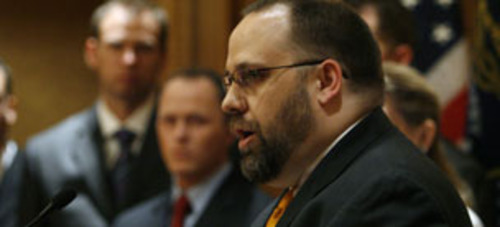This is an archived article that was published on sltrib.com in 2012, and information in the article may be outdated. It is provided only for personal research purposes and may not be reprinted.
A federal judge on Tuesday tossed out two charges against Utah businessman Rick Koerber but allowed 18 of them to go forward from an indictment that alleges the former real estate investment guru operated his companies as a $100 million Ponzi scheme.
The ruling helps clear the way for a yet-to-be-scheduled trial of Koerber, who was first indicted in May 2009 and has been vigorously battling the charges since. The lengthy delay has frustrated the U.S. Attorney's Office, which has been pressing for a trial date as Koeber has filed various motions to squelch evidence, quash the indictment and sanction federal prosecutors.
U.S. District Judge Clark Waddoups ruled that two fraud charges in the 20-count indictment were too vague for Koerber to adequately defend himself against. But in the decision released Tuesday, the judge also said the other counts were backed by sufficiently specific allegations and would remain part of the case.
Waddoups also declined to sanction prosecutors or toss out the indictment because of public remarks they have made about the case in which they called the indictment a case of "affinity fraud," with Koerber using his LDS religion to entice victims to provide funds to his operations.
Koerber's attorney, Marcus Mumford, had asked Waddoups to toss the indictment because of those remarks or to sanction prosecutors and prohibit them from using "any evidence of so-called affinity fraud, unfounded conclusions concerning the numerosity of alleged victims, or using the term 'Ponzi.' " The judge declined to do that in his ruling but said he could act later.
"Defendant has yet to provide evidence that the alleged conduct has impacted his right to a fair trial or an impartial jury," Waddoups wrote.
Mumford said Tuesday that to get two counts of the indictment "thrown out at this stage is very significant" and he was pleased the judge indicated he would hold the government to offering evidence strictly in line with its allegations in the indictment.
The U.S. Attorney's Office for Utah declined comment.
Koerber hotly denies he operated his FranklinSquires Cos. and related entities as a Ponzi scheme, although the indictment alleges he used about half of the $100 million in funds the companies received from investors to pay earlier investors and make the operation appear profitable until it collapsed in 2008 as real estate sales and prices plummeted at the beginning of the Great Recession.
Koerber promoted his "Equity Milling" form of real estate investments on billboards and magazines, and through seminars that people paid several thousands of dollars to attend. He later took out billboards and went on his radio show to tweak state regulators who began probing his operations before its collapse.
Still pending is a motion by Mumford to suppress statements Koerber made to FBI agents in February 2009. Mumford argues Koerber should not have been questioned without his attorney present, while prosecutors say he voluntarily came to the interview and that they believed he no longer was represented by an attorney.
Mumford also argues federal prosecutors assigned to the case should be disqualified because of their role in the interviews, but the U.S. Attorney's Office replied it had a minimal but legitimate participation.
"Mr. Koerber did not run his business as a Ponzi scheme as the government has alleged," Mumford said in an email, and pointed to a hearing scheduled for October when he will present evidence of alleged misconduct by the government.
Twitter: @TomHarveySltrib



